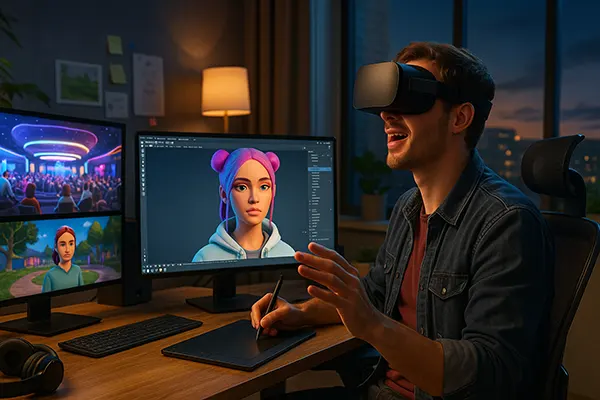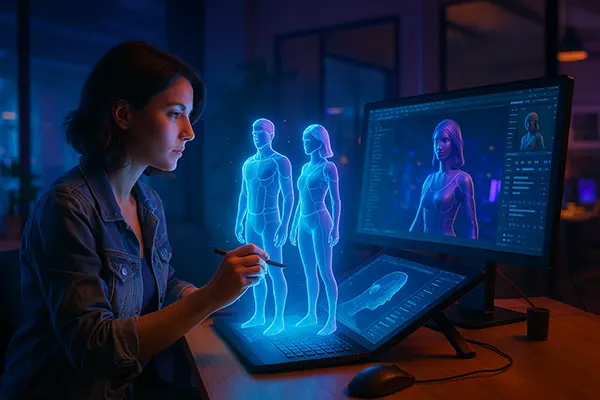
Freelance Income from Creating 3D Avatars and Virtual Events in the Metaverse
The rapid evolution of the Metaverse has opened up real earning opportunities for designers, developers, and digital artists. What was once a futuristic vision is now a functioning economy, where digital creators earn income by designing 3D avatars, building interactive worlds, and organising immersive online events. In 2025, this sector has matured, providing freelancers with stable projects and a growing global demand for virtual experiences.
The Growing Market for Metaverse Freelancers
In 2025, the Metaverse economy is worth billions of dollars, driven by demand for virtual entertainment, digital fashion, and corporate collaboration. Brands are shifting their marketing and events into immersive environments, where users interact through lifelike avatars. Freelancers now play a crucial role in this digital transformation, helping companies design realistic characters, create virtual venues, and develop interactive features.
According to recent market data, the demand for 3D modelers, Unity and Unreal Engine specialists, and VR event coordinators has increased by more than 40% compared to 2023. These professionals are responsible for crafting spaces that feel authentic, social, and emotionally engaging. The most successful freelancers combine technical skill with creativity and a deep understanding of digital identity.
New tools and software like Blender, Ready Player Me, and Spatial.io have simplified the workflow for Metaverse creators. These solutions allow professionals to prototype and publish avatars quickly, export them across multiple environments, and monetise their assets through NFT marketplaces and licensing agreements.
Key Skills and Professions in Demand
The Metaverse requires multidisciplinary talent. Skilled 3D artists create realistic avatars and environments, while developers code interactivity and ensure performance across devices. Event planners specialise in coordinating large-scale virtual gatherings such as concerts, conferences, and product launches.
Soft skills have also gained importance. Freelancers who understand storytelling, community engagement, and branding often secure better contracts. Collaboration with companies from sectors like fashion, gaming, and education is now standard practice for top creators.
Many professionals work on a contract basis through freelancing sites such as Fiverr, Upwork, and Toptal. Rates vary depending on complexity and experience — 3D avatar creation projects may cost from £200 to £2,000, while full virtual events can reach budgets exceeding £10,000.
Monetising 3D Avatars and Virtual Events
In 2025, freelancers use various revenue models. Some sell ready-made avatars and accessories on marketplaces like Sketchfab or OpenSea, while others provide bespoke services for businesses or influencers seeking unique digital identities. Subscription-based projects have also emerged, offering continuous updates or exclusive designs for brand ambassadors.
Virtual events have become particularly profitable. Companies host internal meetings, product presentations, and live concerts inside the Metaverse. Freelancers are hired to design venues, handle lighting and animation, and ensure smooth user experience. Such projects often involve multiple specialists working together remotely, combining artistic vision and advanced coding.
To secure consistent income, many creators build personal brands, share their portfolios on social media, and offer workshops to teach others about digital world-building. The educational segment of Metaverse freelancing is expanding rapidly, as more professionals seek to enter this growing field.
Real-World Examples and Platforms
Platforms such as Decentraland, The Sandbox, and Horizon Worlds continue to lead the industry in 2025. Freelancers collaborate with brands like Nike, Gucci, and Warner Music to design digital spaces and limited-edition collectibles. These projects combine creativity and marketing strategy, turning virtual assets into valuable economic products.
Independent creators also gain visibility through competitions and collaborations with virtual influencers. Avatars with distinctive personalities attract audiences and sponsorships, generating steady income through brand partnerships. The boundary between art, marketing, and technology continues to blur.
In addition, emerging ecosystems such as Somnium Space and VRChat provide access to communities that value authenticity and innovation. Working inside these environments allows freelancers to test new concepts and gather direct feedback from users, helping them improve both aesthetics and functionality.

Future Opportunities and Challenges
The Metaverse freelance market will keep expanding as more companies invest in immersive communication. However, competition will also increase, making quality, originality, and trustworthiness essential for success. Freelancers need to maintain professional standards, protect intellectual property, and adapt to evolving technical requirements.
Artificial intelligence and automation are reshaping creative workflows. AI tools assist with texture generation, motion capture, and voice synthesis, enabling faster production. Still, human creativity remains irreplaceable, especially when projects require emotional nuance, storytelling, and cultural understanding.
To remain competitive, creators must keep updating their skills, follow ethical principles, and maintain transparency about how their digital content is produced. The Metaverse economy rewards those who combine expertise, credibility, and an authentic personal brand — qualities aligned with Google’s E-E-A-T principles.
Long-Term Prospects for Metaverse Freelancers
Over the next few years, the line between physical and virtual employment will continue to blur. Designers may soon work simultaneously in both realities, building avatars for clients attending virtual meetings, exhibitions, or online performances. This will create a hybrid economy with global access to talent.
Governments and educational institutions are starting to recognise the potential of Metaverse-based work. Training programmes and grants for digital creators are already appearing in Europe and Asia, supporting innovation and professional development in this emerging industry.
Ultimately, the Metaverse offers freelancers a sustainable way to turn creativity into income. By mastering both artistic and technical disciplines, professionals can build meaningful careers that connect imagination with real-world value.
